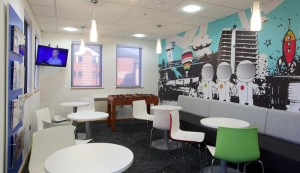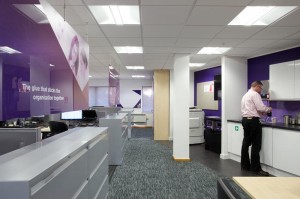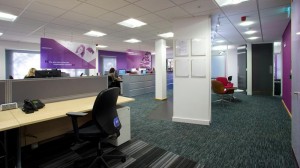An out-dated Eighties office building in North Bristol has been brought back to life following an intensive refurbishment  programme.
programme.
The 6,000 sq ft Bradley Stoke property is owned and occupied by the Society for Endocrinology, which has 62 staff spread across its three floors. When its new chief executive Leon Heward-Mills arrived he was shocked at the inefficient, cluttered, cellular space – calling it one of the worst he had ever seen.
The learned society and charitable organisation also occupied an adjacent overspill building. Keen to implement a positive cultural change on the organisation, Mr Heward-Mills appointed Bristol-based independent interior design consultancy Wylde Interior Architecture to create an inspiring environment and Wylde in turn recommended Alder King’s Bristol building consultancy team, which completed the refurbishment in seven weeks.
The building, 22 Apex Court, Woodlands, was stripped back to its shell and a new more flexible open-plan layout created, with new lighting and improved heating, a cafe and meeting rooms. Eye-catching artwork was commissioned from Bristol-based Artworks Solutions.
 The new meeting rooms and a cafe reduced the total amount of desk floor space but gave the Society greatly-enhanced working conditions and improved efficiency. The overspill building became surplus to requirements, bringing all staff together for the first time and providing a substantial saving on property costs. As many staff work part-time, the new layout perfectly suits the agile working practices.
The new meeting rooms and a cafe reduced the total amount of desk floor space but gave the Society greatly-enhanced working conditions and improved efficiency. The overspill building became surplus to requirements, bringing all staff together for the first time and providing a substantial saving on property costs. As many staff work part-time, the new layout perfectly suits the agile working practices.
Alder King partner Paul Montague said: “The building was in need of a comprehensive refurbishment. Cellular layouts on small floor plates over three floors are the worst kind of space. The refurbishment has completely transformed the building’s appeal and longevity.”
Mike Rowen of Wylde added: “This is an excellent example of how a cost effective refurbishment can rescue a building and reinvigorate the organisation that occupies it. It was a very exciting project and everyone is absolutely delighted with the results.” 
Mr Heward-Mills said: “As an organisation, the Society has gone through a significant rebranding process and enhancement of the way in which we operate. Central to this change has been the need to create a working environment that not only comfortably accommodates our current and anticipated staffing requirements, but one which – from an aesthetic perspective – is an enjoyable, comfortable, practical and inspiring workplace. We believe this has been achieved.”






























